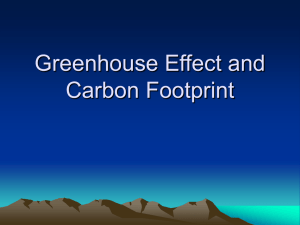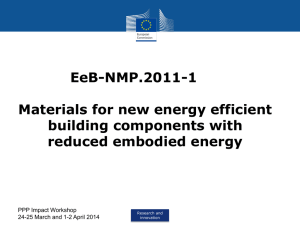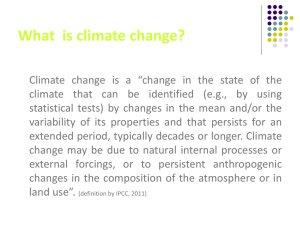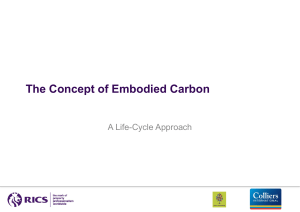ecoattributes ppt
advertisement
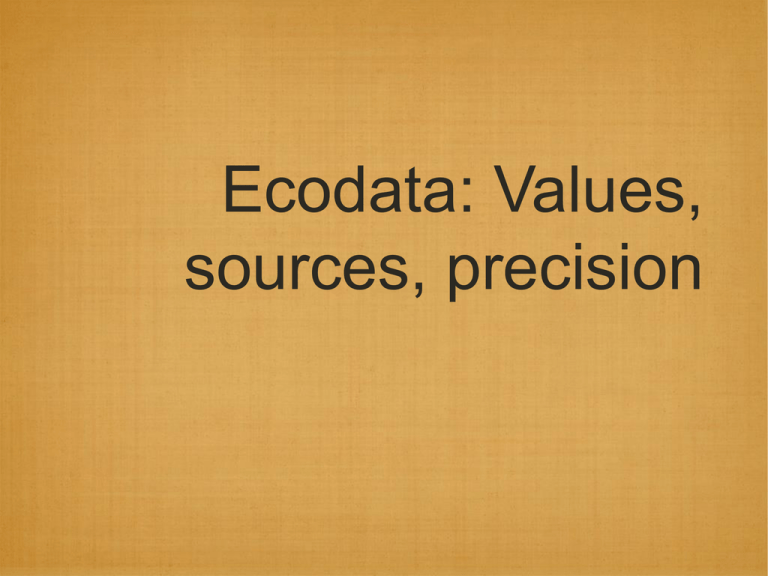
Ecodata: Values, sources, precision Data Accuracy Engineering properties are well characterized. Environmental properties are not. Embodied energy Carbon footprint Embodied Energy Energy to product a unit of mass of material ISO 14040 gives guidelines, but they are vague. How much can we trust the presented values? Studies suggest 10% variance is optimistic. To what end? Although the lack of accuracy is a problem, it depends on the ultimate goals. We can only make conclusions if differences are significant (much more than 10%). Often we see ranges to account for lack of accuracy (200-240 MJ/kg, e.g.) Geo-Economic Data Information about the resource base from which material is draw, and the rate of exploitation. Annual World Production is the mass of material extracted annually from ores/feedstock Reserve, as we know, is current economical sources Ecoproperties: Material Production The embodied energy (Hm) is the energy committed to create 1kg of usable material. CO2 footprint is the release of CO2 into the atmosphere - kg of CO2 for each kg of material produced. Embodied Energy this is not done by pure thermodynamics, due to inefficiencies in actual processes and scrap waste, and other things The Input/Output Analysis is used. The total energy input to the production plant over some period of time is measured; including that already invested in feedstock. The total output (mass of material) over that same time period is recorded. The ratio of these two is the MJ/kg Embodied Energy. Aluminum + Alloys Geo-Economic Data Annual World Production 33-35 M-tonnes/Yr Reserve 2.0-2.2 G-tonnes Eco-properties: material production Embodied Energy (primary prod) 200-240 MJ/kg CO2 footprint (primary prod) 11-13 kg/kg Water usage 125-375 l/kg Eco-indicator 740-820 mPoints/kg Eco-properties: material production Casting Energy 2.4-2.9 MJ/kg Casting CO2 footprint 0.14-0.17 kg/kg Deformation process energy 2.4-2.9 MJ/kg Deformation process CO2 0.19-0.23 kg/kg Recycling Embodied energy accounting Must include the feedstock and its embodied energy in your calculations to get a robust understanding. Suppose we want to study bottles of soda. First we figure out the feedstock by looking at the energy entering the plant per hour and dividing by the mass of PET produced per hour. Energy of PET production Tracking Carbon Carbon tracking is done similar to energy. Carbon emissions come from transport, energy generation, feedstocks, and fuels. Usually expressed as kg of CO2 per kg of material Tracking Carbon Plants grow by absorbing CO2 and H2O and converting it to cellulose and lignin etc. Wood sequesters carbon Some say the carbon footprint of wood is negative (it removes carbon from atmosphere without releasing it) Coal Thinking about sequestering, coal is dervied from plant life. The carbon in the coal was once in the atmosphere. It does not get a negative footprint because we don’t replace it after use. A credit is only real if it gets replaced. Kenaf Kenaf can be grown without fertilizer, and grows fast. It can grow fast enough to convert the carbon used in processes - sometimes over 1 inch per day Wood Is wood more like kenaf or coal? Forests are being removed faster than they are replaced world-wide. Until stocks are replaced as fast as they are consumed, wood should be viewed more like coal than kenaf. Data Precision (Al) Data Precision The mean value of the previous Aluminum chart is 204 MJ/kg. The standard deviation is 58 MJ/kg (c. 25%) If we design on allowables, we include several standard deviations. e.g. Al embodied energy is 100-300 MJ/kg Eco-Indicators Attempts are made to combine energy, water, and emissions into a single ECO-INDICATOR value. EcoProperties Materials are processed and finished. This adds energy to the product. Polymers are molded or extruded Metals are cast, forged, machined Ceramics are shaped (sintering) There is energy with each More steps We’ve made PET pellets, now we need to make bottles... Energy for PET Bottle Production Recylcing and End-of-Life Now that we’ve made bottles, we can still track them. They go to the bottling factory, get filled, used, and possibly recycled. Recycling and End of Life Recycling Often (not always) recycled materials result in reduced embodied energy in a produced object. This is because some of the embodied energy from first life is retained. Energy for Recycling Special cases: Precious metals and electronics Precious metals used in small quantities, but have a high embodied energy, carbon, and cost. Generally have exception conductivity, resistance to corrosion and thus make good electronics parts. Same is true of electronics themselves Electronics & Precious Metals (approx energy) Component Embodied energy (MJ per...) Carbon Footprint (kg per...) Small electronic devices (per kg) 2,000-4,000 200-400 Displays, per sq. m. 3,000-3,750 300-375 120-140 12-14 180-220 18-22 Assembling of printed wiring boards (per kg) Batteries (Ni-Cd rechargeable) (per kg) Energy Intensities Fuel kg OE MJ/liter MJ/kg CO2, kg/liter CO2, kg/MJ CO2, kg/kg Coal, lignite 0.45 -- 18-22 -- 0.08 1.6 Coal, anthracite 0.72 -- 30-34 -- 0.088 2.9 Crude oil 1.0 38 44 3.1 0.07 3.0 Diesel 1.0 38 44 3.1 0.071 3.2 Gasoline 1.05 35 45 2.9 0.065 2.89 Kerosene 1.0 35 43.8 3.0 0.068 3.0 Ethanol 0.71 23 31 2.8 0.083 2.6 Liquid natural gas 1.2 25 55 3.03 0.055 3.03 Electricity Generation MJ CO2 Efficiency OE/kw-hr kg/kW-hr Fossil fuel Country Fossil Nuclear Renewables Australia 92 0 8 33 10.0 0.71 China 83 2 15 32 9.3 0.66 France 10 78 12 40 0.9 0.06 India 81 2.5 16.5 27 10.8 0.77 Japan 61 27 12 41 5.4 0.38 Norway 1 0 99 -- 0 0 United Kingdom 75 19 6 40 6.6 0.47 United States 71 19 10 36 7.1 0.54 Transport Products are made in cheapest location and then transported to customer We express energy of transport as energy per tonkm, and CO2 in kg/ton-km Transport Energy Energy Fuel and vehicle type Diesel - ocean shipping Diesel - coastal shipping Diesel - rail Diesel - 32 ton truck Diesel - 14 ton truck Diesel - light goods vehicle Gas - family car Diesel - family car LPG - family car Gas-Hybrid family car Gas - super sports/SUV Kerosene - long haul aircraft Carbon (MJ/ton-km) (kg/ton-km) 0.16 0.27 0.31 0.46 0.90 1.36 2.06 1.60 3.87 1.55 4.76 8.30 0.015 0.019 0.022 0.033 0.064 0.097 0.14 0.11 0.18 0.10 0.31 0.55 Exploring the data Bar charts vs Bubble Charts Bar charts show a value for each item Range of bar shows range of values Bubble charts show ranges for a material that have two different properties Watch for logarithmic axes! Material Property Charts Give an overview of physical, mechanical, functional properties in a compact way Reveal aspects of physical origins of properties Tool for optimized selection of materials to given design requirements Allow properties of new materials to be displayed and compared with conventional materials Tensile Modulus of typical materials Modulus and Density Metal recycling in current supply (%) Polymer recycling in current supply (%) Ceramic recycling in current supply (%) Natural and Hybrid
